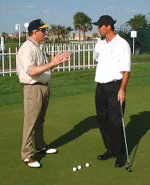
How More Practice Doesn’t Always Make Perfect
Expectations have a unwanted impact on your golf game. With a clearer understanding of expectations, you can learn how to manage them and improve your golf game in the process.
In our golf survey, one respondent made an interesting point regarding expectations and performance:
“How can l stop the illusion of expecting my best performances to be played at all times? This expectation prevents me playing uninhibited. I practice a lot & probably feel that l should play much more consistently than if l practiced less as others claim to be the case.”
This problem is quite common among golfers, as well as athletes in other sports.
The question seems straightforward… If I practice more, shouldn’t I play better?
The answer is YES! But only to a degree.
Practice is a form of preparation. Focused preparation, as long as it is not over training or aggravating an injury, helps you build trust and confidence in your ability to perform.
The issue has very little to do with the amount of practice. The big issue is the excessively high expectations you have set for yourself when on the golf course.
Expectations and performance have an inverse relationship… As expectations increase, performance usually decreases.
You believe every practice round, every bucket of balls on the driving range, every hour on the practice greens and every swing you take should improve your score. Your belief or your expectation is that the more you do, the better
you will play.
Perfectionists, for example, think that if they shot 70 one time, they should shoot this score or better every time. One pro golfer I work with thinks that every shot must match the best shot he’s hit with that club in the past!
This is why golfers sabotage their mindset and not get the most from their hours of practicing.
For example, over the past month, you played an extra round of golf each week preparing for a tournament. You also worked with a golf pro to sharpen up your short game.
Any time you could, you would go the driving range and hit a bucket of balls. You fully expected, with all this extra practice, you would shave several strokes off your score.
The day of the tournament, you are much more anxious than excited to play. You think, “If I don’t shoot my best score, then all this hard work was wasted. A very slight wind starts to bother you and messes with your head. The doubts start creeping into your mind.
After the front nine, your score is the same as you usually shoot. You feel the pressure to play the best nine holes of your life. The pressure you feel is crazy. You start pressing and that’s when the mistakes start piling up.
Instead of playing a solid round of golf, your score balloons because you become upset with not reaching your standards.
Your unrealistic expectations and added pressure you have created for yourself, you have increased the difficulty of an already challenging game.
Sure, one way to counter this may be to cut back on the extra practice, but if you are not dealing with your excessive high expectations, your problem will continue.
Manage your High Expectations
Step 1: Identify your strict expectations.
Step 2: Discard your expectations and focus on more important objectives…
Step 3: Replace your expectations with smaller objectives you can do 10 out of 10 times, such commit to the club and target, trust your swing, be decisive on the greens.
Related Golf Psychology Articles
- Can Hypnosis Improve Your Golf Score
- How to Shoot Consistent Scores in Golf
- Focus on the Process, Not Target Scores
- Subscribe to The Golf Psychology Podcast on iTunes
- Subscribe to The Golf Psychology Podcast on Spotify
Golf Mental Coaching Programs

All golf psychology programs include the Golfer’s Mental Aptitude Assessment (GMAP), a custom Mental Game Plan, weekly coaching sessions, unlimited email correspondence, and The Golfer’s Mental Edge 2.0 workbook program.
One-on-one mental coaching is the fastest and most effective method to improve your mental game, boost your performance, and make lasting changes!
We have unique mental coaching programs, customized for you. Please contact us with any questions your have about our programs. Provide your name, email, and role below:
Or Call us today at 888-742-7225 | Mental Game Success Stories